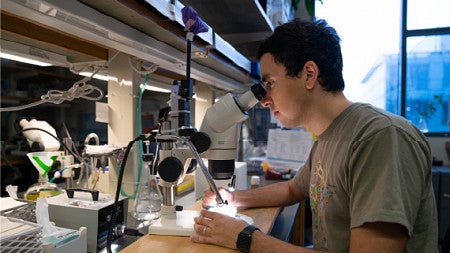
Nelson Perez-Catalan in the Doe Lab researching the brain cells of fruit flies in 2019.
Story by Lauren Tokos, CHC Communications
Photo by Nic Wolcott, Central Communications
When Nelson Perez-Catalan graduated from the Clark Honors College in 2020, he had already completed years of neuroscience research at the University of Oregon. It was that experience that would launch him into a prestigious research program at Yale University, where Catalan is currently pursuing a Ph.D. in addition to a medical degree.
When Catalan arrived at the University of Oregon from his native Chile, his academic writing skills were limited. However, Catalan managed to develop those abilities. “The heavy writing curriculum of the honors college helped me tie sentences together in a way that was elegant and effective, which also translated really well for [scientific] paper writing,” he said.
Catalan, who also delivered the commencement address in 2020, worked with Dr. Sarah Ackerman as an undergraduate in the Doe Lab on campus. His primary focus was on the neurological development of fruit fly stem cells, and over time, Catalan gained independence in his position. He proposed creating a visual representation of neurons connecting, an idea that became Catalan’s honors thesis, which would eventually evolve into an article — with Catalan and Ackerman as authors — published in Nature, a prestigious academic journal which highlights scientific research from around the world.
Catalan credits CHC interdisciplinary education for this accomplishment. “The general university training most of my peers got was very, very scientific,” he said. “The CHC breaks that pattern . . . and because of that, I learned to explain my research to people who were unfamiliar with the topic.”
Now, as a postgraduate research associate at Yale, Catalan investigates neurodegeneration in mice, with a concentration on Alzheimer’s Disease. Using “two-photon microscopy,” a process that uses infrared light on live samples, Catalan visualizes the neural properties of mice.
He hopes to begin working on his medical degree in the coming year, in addition to continuing his Ph.D. program. “It's a lot of work merging the two modalities; academic work as a PhD and medical research as an MD,” Catalan said. “But doing a dual degree will be my end goal.”
Catalan encourages current and future CHC students to be optimistic about their academic and professional goals.
“Life is very unpredictable. And interests are very unpredictable. But we are in the driver's seat, and we can steer left or right,” he said. “If you steer towards something that you like to do, even though it might not be something that everybody's doing, it might not be something that you are told to do, but it's something that you want to do, it's going to be a good direction.”
